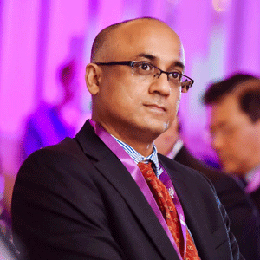07 April 2016
 An international expert in the relationship between chronic inflammation and the development of cancers will be leading a new research laboratory collaboration between the University of South Australia and SA Pathology’s Centre for Cancer Biology (CCB) and the Institute of Molecular and Cell Biology (IMCB) within the Agency for Science Technology and Research (A*STAR) in Singapore.
An international expert in the relationship between chronic inflammation and the development of cancers will be leading a new research laboratory collaboration between the University of South Australia and SA Pathology’s Centre for Cancer Biology (CCB) and the Institute of Molecular and Cell Biology (IMCB) within the Agency for Science Technology and Research (A*STAR) in Singapore.
Securing $1 million in support from the Department of State Development through its South Australian Research Fellowship program (SARF), Professor Vinay Tergaonkar will join the CCB team to lead cutting-edge research into inflammation in a variety of cancers and the development of new drug treatments to block inflammation selectively, rather than generically.
The Fellowship is one of only two awarded annually for a term of up to five years.
Vice Chancellor of the University of South Australia, Professor David Lloyd says the partnership is a perfect example of how international collaborations can benefit South Australia and sow the seeds for future industries.
“This is a significant investment by the University and the State Government but one that will continue to reap great rewards by building the State’s potential for national and international leadership in aspects of cancer research,” Prof Lloyd says.
“Prof Tergaonkar’s appointment with UniSA has already underpinned a successful infrastructure grant of $2 million from the Australian Cancer Research Foundation and attracted support from the Cancer Council SA and other funding bodies.
“This builds on our successful partnership with SA Pathology through the CCB by bringing new players into the partnership - Singapore’s Institute of Molecular and Cell Biology (IMCB) within the Agency for Science Technology and Research (A*STAR) – and creating the right environment to accelerate that research.
“Aligned with the objectives of the SARF Program, the new joint laboratory with A*STAR will harness the expertise of an international team of researchers in South Australia to work on the science that will lead to a better understanding of cancer and improved treatments.”
Prof Lloyd says the collaboration provides access to scientific expertise, equipment, and the sharing of data, and will support continuing research exchange opportunities between SA and Singapore, nurturing higher degree research students to undertake research into cancer therapies.
The SARF Program aims to expand the State's research talent to support world-class research leadership that will have a direct strategic benefit to South Australian industry and the State’s economy.
The program recruits world-class interstate or international researchers with leading-edge expertise in their field and strong potential to significantly enhance the State’s research strengths in priority sectors.
Since the award of his PhD in 2001, Prof Tergaonkar has had a stellar research career having published in the best scientific journals. He is on the external advisory council for the Center for Molecular Screening and Chemical Genomics, University of Florida and in 2010 was nominated for the President’s Science and Technology Medal in Singapore (the country’s highest honour for research scientists).
About the CCB
The Centre for Cancer Biology (CCB) carries out a world-class program of innovative research, making breakthrough discoveries in the fundamental causes of cancer, and translating these discoveries into new ways to prevent and treat this group of diseases.
An alliance between SA Pathology and the University of South Australia, the CCB has the largest concentration of cancer research in South Australia, currently hosting 22 full-time research groups undertaking research into leukaemia, breast cancer, prostate cancer, skin cancer and colon cancer, focussing in the specialised areas of gene regulation, molecular signalling, translational oncology and cancer genomics.
About IMCB
The Institute of Molecular and Cell Biology (IMCB) is an autonomous research institute (RI) of A*STAR, was established to develop and support the biomedical R&D capabilities in Singapore.
The creation and development of IMCB has catalysed the transformation of Singapore into an international hub for biomedical research, development and innovation.
Today, IMCB has established itself as a premier molecular and cell biology institute. Researchers at the institute have more than 2,000 publications and the institute has trained more than 220 postgraduate students.
Media contact: Michèle Nardelli office +61 883020966 mob 0418823673 email michele.nardelli@unisa.edu.au




